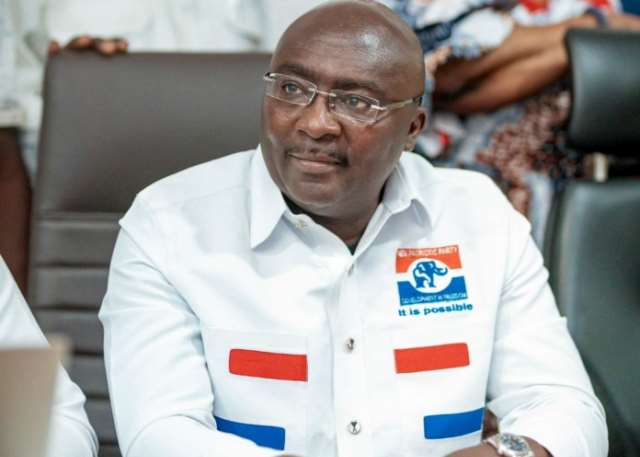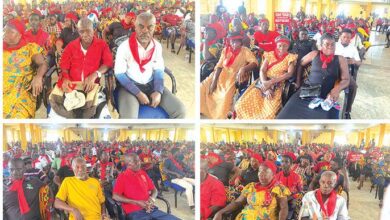Massive Rot Uncovered in Bawumia’s Gold-for-Oil Deal

A damning international forensic risk assessment has uncovered massive financial losses, systemic fraud, and deliberate opacity in Ghana’s controversial Gold-for-Oil (G4O) programme, spearheaded by former Vice President and New Patriotic Party (NPP) 2024 flagbearer, Dr. Mahamudu Bawumia.
The confidential report, conducted by a team of international investigators, estimates that Ghana lost a staggering GH₵ 7.2 billion in potential revenue due to illicit financial flows, governance breakdowns, and opaque transactions embedded within the programme.
The development has raised concerns from IMANI Africa and a coalition of oversight institutions, who are calling for an immediate and comprehensive forensic audit, the recovery of lost revenues, and the prosecution of those responsible.
On the gold side of the barter arrangement, the report found no formal contracts between the Bank of Ghana (BoG) and the Precious Minerals Marketing Company (PMMC), a major lapse that enabled weak pricing controls, discretionary exchange rate practices, and mandatory delivery quotas that reportedly encouraged gold smuggling.
The report described the G4O structure as a “deliberate architecture of obfuscation,” designed to conceal value leakage and frustrate public accountability.
Fuel Imports and Tax Leakages
Serious concerns were also raised regarding fuel imports. Investigators found that several fuel cargoes arrived in Ghana without proper documentation—including missing BOST receipts and absent customs declarations.
Although GH₵7.5 billion in import tax exemptions were legally granted, the lack of reconciliation and transparency has left the state exposed to GH₵ 7.2 billion in unaccounted losses.
The Bulk Oil Storage and Transportation Company (BOST) reportedly held monopolistic control over G4O cargoes, facilitating tax avoidance and smuggling operations outside official oversight.
The report further highlights that several foreign firms contracted under the G4O programme had opaque ownership structures and ties to jurisdictions flagged for money laundering and sanctions evasion—including Dubai, Cyprus, and Switzerland.
Some of these entities were previously identified in international anti-corruption databases, raising additional concerns about vetting failures in supplier selection.
Key Findings from the Report
The assessment triangulated data from the National Petroleum Authority (NPA), BOST, and the Customs Division of the Ghana Revenue Authority (GRA), and uncovered the following critical issues:
- Governance Collapse in Gold Transactions
Absence of Foundational Contracts between BoG and PMMC.
Weak Pricing Oversight: No independent assay checks or adherence to global pricing benchmarks such as LBMA rates. Discretionary FX Rates applied by BoG created opportunities for arbitrage.
Market Distortion: Mandatory gold quotas reportedly incentivised smuggling and manipulation of gold quality.
- Systemic Leakages in Fuel Transactions
Missing Documentation: Several fuel cargoes lacked proper BOST and customs records.
Unchecked Tax Exemptions: Lack of downstream tracking of tax-exempted imports resulted in massive revenue losses.
Monopolised Control:
BOST’s dominance reportedly facilitated illicit fuel sales and avoidance of regulatory scrutiny.
- High-Risk International Suppliers
Partner firms had obscure ownership and connections to sanction-sensitive jurisdictions. Some were previously flagged in international reports for money laundering and trade-based fraud.
The report concludes unequivocally that these failures were not the result of negligence, but rather part of a coordinated effort to evade oversight and misappropriate state resources.
A supplementary brief raises further allegations against former BOST officials and an allied private company, implicating them in: Undisclosed offshore assets, Trade-based money laundering and Breaches of fiduciary duty.
Civil Society Reactions
Prominent voices from Ghana’s policy and civil society sectors have expressed outrage.
Dr. Ishmael Evans Yamson, Chairman of Ishmael Yamson & Associates and participant in the recent National Economic Dialogue, called the revelations “frightening,” accusing political actors of colluding with criminal agents to sabotage Ghana’s development.
“This is one of many initiatives dressed up as solutions to economic challenges, but in reality, they are vehicles for looting. The government must act decisively,” he said.
Franklin Cudjoe, Founding President of IMANI Africa, stated “This forensic assessment confirms our worst fears—Gold-for-Oil was not merely mismanaged; it was weaponised against the state.”
Bright Simons, Vice President of IMANI, added “The programme was shrouded in pageantry to distract the public. While citizens were misled, millions of dollars were siphoned into private pockets. There was no innovation here—only systemic exploitation.”
IMANI’s Demands:
In response, IMANI Africa is calling for:
A comprehensive forensic audit of all G4O transactions, tracing each vessel and gold consignment from origin to retail.
Criminal prosecutions and asset recovery for individuals and entities implicated.
Retroactive tax assessments and clawback of exemptions where due diligence failed.
Institutional reform, including the quarterly publication of all G4O contracts, pricing mechanisms, and audit reports.
“Delay in enforcing accountability is complicity. Ghana must act now,” IMANI warned.
Former BOST CEO Speaks
But speaking with on Joy FM on Monday September 29, Dr. Edwin Provencal, former Managing Director of BOST, welcomed calls for investigation:
“If there are untoward findings, the law should proceed. But I believe the programme—from the Ministry of Energy to BOST and the Bank of Ghana—was managed transparently.”
He emphasized that any probe should follow due process and respect legal standards.



